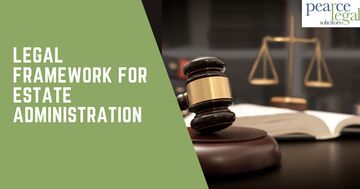What Is Estate Administration
Property| 13.10.2023
If you have been given the task of dealing with the estate of a family member, friend, or another person who has recently died, you may be unsure of the process and steps to be taken; this is referred to as estate administration. Estate administration is the legal process that takes place after someone dies and involves the management, valuation, distribution, and settlement of their assets, debts, and liabilities.
As an Executor or Administrator, it is your role to ensure the wishes of the person who has died are carried out, and their estate is distributed among their beneficiaries in complete accordance with the law. In this article, we will explain what is meant by estate administration and the main tasks that this vitally important role entails.

Legal framework for estate administration
The main law governing estate administration in England and Wales is the Administration of Estates Act 1925. The Act sets out the rules and procedures for the distribution of assets, the appointment of personal representatives (i.e. the Executor or Administrator), and the payment of debts and taxes.
The process of estate administration is also heavily influenced by the Will of the person who has died (assuming one exists). Ultimately, the law emphasises the right of individuals to dispose of their property as they see fit through a valid Will. If there is no Will, the estate will be distributed in accordance with the ‘rules of intestacy’, which prioritises surviving spouses or civil partners and blood relatives when it comes to inheritance.
Who are the key people involved in estate administration?
Estate administration involves several key parties, each with distinct roles and responsibilities, as follows:
Personal Representatives
Personal representatives (PRs) are individuals or professionals appointed to administer the estate of the person who has died. PRs can be Executors named in the Will or Administrators in cases of intestacy. Both are responsible for gathering and valuing assets, paying any debts and taxes, and distributing the estate to beneficiaries.
Beneficiaries
Beneficiaries are those who receive a share of the deceased’s estate (i.e. people or organisations). They may have been named in the Will by the testator or determined by the rules of intestacy. Beneficiaries have a vested interest in the proper administration of the estate to ensure they receive their rightful inheritance.
Creditors
Creditors are individuals or organisations to whom the deceased owed money. One of the main parts of estate administration is making sure that any debts owing are identified and paid before any inheritance is paid out to beneficiaries. Creditors also have the right to make claims against the estate to recover their outstanding debts.
HMRC
HMRC is responsible for collecting inheritance tax where it applies. Executors and Administrators prepare and submit an inheritance tax return and pay any outstanding taxes on behalf of the deceased’s estate.
The Probate Registry
The Probate Registry is a branch of the Family Division of the High Court and is charged with managing the process of granting probate (or letters of administration). Probate is the legal authorisation for the Executor to manage the estate of the person who has died and must be granted before dealing with the estate.

What are the steps involved in estate administration?
Estate administration can be a complex and lengthy process involving several key steps:
- Gathering Information: The personal representatives must first gather all relevant information about the deceased’s estate, including their assets, debts, and liabilities. This involves obtaining copies of the Will, bank statements, property deeds, and any other relevant financial records.
- Probate Application: If a Will exists, the Executor or Administrator needs to apply for a grant of probate from the Probate Registry before handling the estate. If there is no Will, they will need to apply for ‘letters of administration’. This involves submitting the necessary documents and paying the required fee.
- Valuing the Estate: The next step is to work out the value of the deceased’s estate, including their property, investments, and personal belongings. The value of the estate will be used to work out how much inheritance tax is owed.
- Paying Debts and Taxes: Executors or Administrators identify and pay any outstanding debts, including funeral expenses, loans, and credit card balances. They also settle any inheritance tax owed to HMRC.
- Distributing Assets: Once debts and taxes are paid, the remaining assets can be distributed to the beneficiaries in accordance with the will or intestacy rules.
- Final Accounts: Personal representatives are required to prepare a set of final accounts detailing all financial transactions and distributions made during the estate administration process.
- Distribution of the estate: Any inheritances can be divided and given to the respective beneficiaries.
Why instruct a Solicitor to administer an estate?
There are several reasons why instructing a Solicitor to administer an estate is highly beneficial, as follows:
Complexity: The legal framework governing estate administration can be extremely complex and time-consuming, and personal representatives may require legal advice to navigate it successfully.
Disputes and Contests: Disagreements among beneficiaries, challenges to the Will, or disputes over asset distribution can extend the estate administration process and lead to litigation. Estate administration Solicitors understand how to deal with such issues efficiently and effectively.
Taxation: Inheritance tax rules can be complex, and miscalculations or errors in tax returns can lead to financial penalties.
Asset Valuation: Valuing certain assets, such as art, antiques, or shares in a family business, can be challenging and may require professional appraisals.
Emotional Stress: Executors may themselves be going through a time of emotional upheaval and stress following the death of a family member or friend and would prefer a professional to handle the process of estate administration on their behalf.
Final words
Estate administration in England and Wales is a lengthy and complex process that involves various legal, financial, and emotional considerations. Professional advice and careful planning are key to successfully navigating estate administration and fulfilling the wishes of the deceased.
Pearcelegal has a caring and dedicated private client law team who can advise and represent you on estate administration and any other legal matter if a loved one has died. To make an appointment, please contact us on 0121 270 2700 or enquire through our contact form.
Expert advice for you Book a free consultation
The team at Pearcelegal will be delighted to discuss your legal matters and give you a no-obligation quote.



